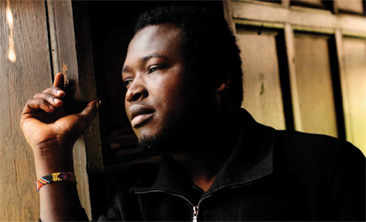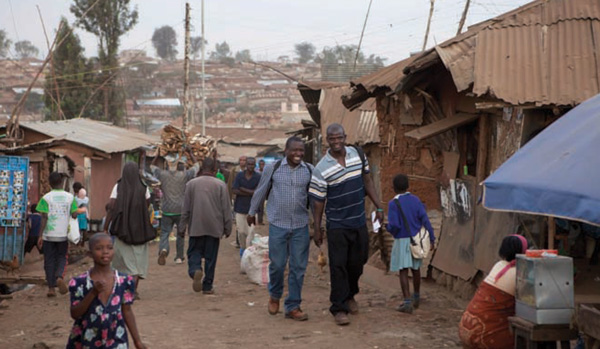As a boy sitting in his 10-foot by 10-foot shanty in Kibera, Kenya, one of Africa’s largest slums Kennedy Odede never could have dreamed where his life would take him. But in the past five years, the 27-year-old Odede managed to land himself a four-year scholarship at Wesleyan University in Connecticut, and co-found (and is the CEO of) Shining Hope for Communities (SHOFCO), a nonprofit devoted to combating gender inequality and extreme poverty in Kibera. Oh, and he also shared the podium with Bill Clinton and Sean Penn at the Clinton Global Initiative University’s closing Plenary Session, a forum that brings together young leaders from across the globe to share, discuss, and formulate action on global issues, and was recently invited to become a CGI member, an honor given to heads of state, Nobel Prize winners, and business titans.
Odede’s rise from painfully humble beginnings to running an organization that, in the past two years, has improved the lives of over 11,000 people is an impressive accomplishment—made even more remarkable because prior to attending Wesleyan, Odede had no formal education. Like many stories of triumph, this one starts with a son’s love for his mother. “My mother [Jane] is an incredibly strong woman who loves her children very much,” Odede says. “She is an innovative thinker who imagined the possibility of a promising future.” The eldest of eight children, Odede began selling peanuts on the streets at age 7 to help feed his family. Kibera, roughly the size of New York’s Central Park, is home to over 1.5 million people. There are no roads, schools, health care, clean water, or sanitation. In fact, one in every five children does not live to see their fifth birthday, and 66 percent of girls trade sex for food, many as early as age 6.
 After watching his mother suffer at the hands of his abusive father, his sister become pregnant at the age of 16, and many of his friends resort to lives of crime and prostitution, Odede decided that he had to do something to pull himself out of this desperate situation. “Getting out of Kiberais such a feat that few even dare to dream,” he explains. Odede dreamed of a better life, reading Colin Grant’s Negro with a Hat and essays by Martin Luther King Jr., and finding inspiration in his heroes, activists Nelson Mandela and Marcus Garvey.
After watching his mother suffer at the hands of his abusive father, his sister become pregnant at the age of 16, and many of his friends resort to lives of crime and prostitution, Odede decided that he had to do something to pull himself out of this desperate situation. “Getting out of Kiberais such a feat that few even dare to dream,” he explains. Odede dreamed of a better life, reading Colin Grant’s Negro with a Hat and essays by Martin Luther King Jr., and finding inspiration in his heroes, activists Nelson Mandela and Marcus Garvey.
In 2004, with only 20 cents in his pocket, Odede purchased a soccer ball, hoping to distract his young friends from their hunger and sorrow. The response was astounding and Odede expanded to include a theater program; it quickly became a thriving grassroots peoples’ movement focused on youth and women’s issues through sexual health/HIV education as well as on microfinance initiatives. Odede became so popular in his community that many of the Kibera residents soon started calling him “mayor.” “We, the people who live here and grow up here, understand the dream and know what it takes to make it better,” Odede explains. “Although we have no money, we have the power of the people, which is more powerful than any money. When the people know they have the ability to help themselves, they are on fire.”
Odede’s reputation spread across the slum to neighboring Nairobi, where Wesleyan student Jessica Posner, on a study-abroad term, heard of Odede and his community outreach endeavors. Posner met Odede and was so awed by him that she decided to stay and work in Kibera. It was the beginning of a flourishing friendship and partnership that led to Posner receiving the $100,000 Do Something grand prize last year as the “top world changer under 25.”
As Odede became more vital to his community, he also became the target of adversaries who wanted him dead. Posner helped Odede escape to Tanzania, where she encouraged him to apply to American universities. Wesleyan, recognizing the potential in this exceptional young man, agreed to bring Odede to America on a full scholarship.
Rob Rosenthal, the vice president of academic affairs and the provost at the school, was Odede’s department adviser, mentor, and now good friend. Rosenthal was first assigned as Odede’s freshman adviser, and they met weekly to discuss the nuances of American life and culture. “Kennedy is like a sponge and is incredibly bright,” says Rosenthal.
At the end of Odede’s freshman year, he (with Posner by his side and $10,000 that he had received from 100 Projects for Peace, a nationwide competition sponsored by the international philanthropist Kathryn W. Davis) told Rosenthal of his plans to build a school for girls in Kibera that summer. Rosenthal thought that it couldn’t be done given the short time period and limited funds, but Odede and Posner succeeded in raising another $10,000 from individual donors.
In August 2009, the Kibera School for Girls, the region’s first tuition-free school, opened its doors. The school currently serves 64 girls, ages 5 through 9, from pre-K to grade 2, providing nourishing meals, uniforms, and school supplies. The eight-classroom school also houses a multipurpose room and a library. Rosenthal remains humbled by Odede’s unwavering loyalties to his people back home. Other individuals in a similar situation, he says, finally having tasted the better life, would surely not have thrown themselves back into the lion’s den.
Nathan Mackenzie, a senior at Wesleyan, has spent two summers in Kenya working for SHOFCO. Mackenzie remembers first meeting Odede at school and was intrigued by his unique story. In time he became even more impressed with Odede’s magical people skills. “Kennedy is able to connect with people from all different kinds of backgrounds and is always interested and in tune with peoples’ individual stories,” he says. “Knowing this, to hear that he was a leader in his community—the ‘mayor of Kibera’—didn’t surprise me.”
Raising close to $1 million since 2009, Odede believes that nothing is impossible and knows firsthand how sheer determination, hard work, and passion can fuel one man’s mission, creating a rippling effect of enormous magnitude—the Shining Hope Community Center, offering a multitude of social programs for all residents, the Clean Water Project, delivering 20,000 liters of affordable water every day, and the Toilet Access Project, building innovative bio-latrine centers where the methane is captured and converted for use as electricity at the school, are just some examples that prove his belief. And although Odede continues to be the face of SHOFCO, he says humbly, “I am aleader who knows how to work with smart people.”
Odede has moved seamlessly from the classroom to the boardroom, receiving generous funding from Dell, Echoing Green, and the Newman’s Own Foundation, which is SHOFCO’s largest supporter. His spectacular rags-to-recognition story has been featured in the New York Times and on NBC Nightly News and CNN. And Odede’s blog, Black Kennedy Odede (bkodede.wordpress.com), reveals a more
Nightly News and CNN. And Odede’s blog, Black Kennedy Odede (bkodede.wordpress.com), reveals a more personal side of Odede and the organization that he has helped build and grow.
Given that Odede has had a healthy dose of media attention, he seems unfazed by his celebrity status, both on and off campus. “What you see is what you get with Kennedy. He is a wonderful guy, who is humble but focused, and knows what he wants,” Rosenthal confirms.
On a glorious fall day at Wesleyan, Odede, smiling, in a crisp white shirt and black slacks, recounts his compelling personal journey to a group of Wesleyan parents and students.
He is gritty and he is real. “When I speak of Kibera, I always see my people in front of me. I will never forget them,” Odede says, with sudden sadness transparent in his intense dark eyes. But Odede’s next words are far from hopeless when he proudly lists the numerous projects and work that SHOFCO is doing in Kibera.
The sky seems to be the limit for Odede. In fact, when a group of Wesleyan University students in a Physics for Future Presidents class were asked to name a peer destined to be a president of a nation, they unanimously pointed to their fellow student. If the next five years are anything like the last five, how could Odede argue?
> This article by Rena Godfrey appeared in lifestyles magazine’s New Year 2012 edition.
